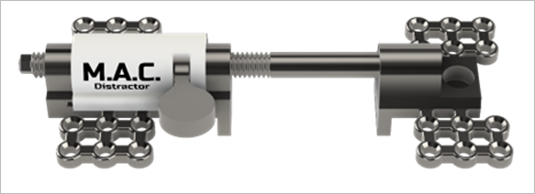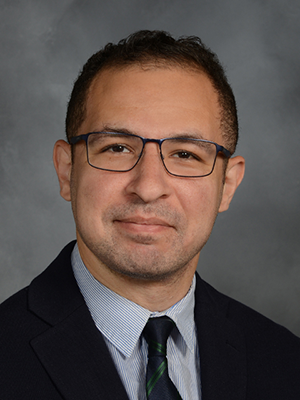Mohammed A. Fouda, MD, a fellow in neurosurgical oncology and neurosurgical innovations in the Department of Neurological Surgery, has been awarded a two-year, $400,000 grant from the Weill Cornell Medicine Daedalus Fund for Innovation. The grant is for the development of a Magnet Actuated Cranial (MAC) Bioresorbable Distraction System — a less risky, more cost-effective solution to the treatment of syndromic craniosynostosis and patients with craniomaxillofacial (CMF) abnormalities than is currently available. The Level II grant is released in two stages, with the second year’s funding contingent upon meeting first-year milestones.
Children with syndromic craniosynostosis, which results from the premature fusion of cranial, midface, and skull base sutures, experience not only cosmetic abnormalities but also elevated intracranial pressure, limited space for brain development, and risks to the orbital socket. Surgical intervention initiates a gradual expansion of the skull to restore normal cranial anatomy and reduce elevated intracranial pressure, but current distractors (which prompt incremental new bone growth once the fused sutures are opened) require external activation ports that are vulnerable to infection. They also require a second surgery to remove them once the new bone has been generated. Dr. Fouda’s proposed new distraction system is entirely internal, reducing the risk of infection from an external port, and is made of bioresorbable materials that eliminate the need for the second surgery.

The innovative MAC distractor will be completely internal, with no components outside the skull, as well as bioresorbable, so it does not have to be removed.
“This device offers several unique features,” explains Dr. Fouda. “Unlike existing distractors, which require manual intervention to edge skull plates apart and prompt new bone growth, this system uses a wrap spring clutch mechanism to generate that tiny separation between targeted bone segments. A magnet in the activator moves a lever to create small, discrete movements that add up to the desired distraction. And since the system is bioresorbable, there is no need for a second surgical intervention to remove hardware.” The team has filed a patent application for the innovative device.
This new system has the potential to revolutionize care for children with syndromic craniosynostosis, not only in Western nations but also — and perhaps most importantly — in low- and middle-income countries. Children in those areas often aren’t treated at all due to the cost of the surgeries and the risk of infection. This new system represents a tremendous advance that will allow more children worldwide to be treated, safely and at lower cost.
Dr. Fouda recently published a paper on the topic, “Posterior cranial vault distraction in children with syndromic craniosynostosis: the era of biodegradable materials-a comprehensive review of the literature and proposed novel global application,” which appears in the March issue of the journal Child’s Nervous System. His co-authors include his mentor Susan Pannullo, MD, and Caitlin Hoffman, MD, co-director of the craniosynostosis program at Weill Cornell Medicine Neurological Surgery, along with Laurel Seltzer of Tulane University Medical School and Kyle Zappi, a medical student at Weill Cornell Medical College who is also working on his master’s degree in engineering from the Meinig School of Biomedical Engineering at Cornell University.
Dr. Fouda’s fellowship is funded through the philanthropy of Talia and Mark Rubenstein in the interest of fostering innovation in neuroscience. The fellowship is overseen by Dr. Susan Pannullo, professor of clinical neurological surgery at Weill Cornell Medicine and adjunct professor of biomedical engineering at the Meinig School of Biomedical Engineering at Cornell University in Ithaca. The MAC distractor is one of a dozen projects with patents pending thanks to the generosity of the Rubensteins.
“I applaud the spirit of innovation and commitment to technological excellence behind this new device,” says Dr. Philip Stieg, Margaret and Robert J. Hariri, MD ’87, PhD ’87 Professor of Neurological Surgery and Chair and Neurosurgeon-in-Chief of NewYork-Presbyterian/Weill Cornell Medical Center. “Those are two of the core values of our department, along with scientific curiosity and perseverance. It is also a testament to mentorship, and to the collaborative nature of a project that involves students, faculty, and fellow at multiple campuses. This project is a credit to the teams in New York City and in Ithaca, and will be a game-changer for children.”
Dr. Fouda will be working on prototyping, materials testing, and validation of the new system over the next year. In addition to Drs. Pannullo and Hoffman, Dr. Fouda’s team includes Thomas Imahiyerobo, MD, co-director of the craniosynostosis program at Weill Cornell Medicine and section chief of pediatric plastic and reconstructive surgery at Columbia University; Professor Newton DeFaria from the Meinig School of Biomedical Engineering at Cornell University and a group of biomedical engineering and MD/MEng program students, including Kyle Zappi, Myles Wood, Farid Aboharb, Connor Bittlingmaier, Joushva Kamble, Edward McGettigan, Ziyang Zheng, Willa Wei, and Vivian Zhao. The team will have the administrative and logistic support of Donna J. Rounds and Eric Colin Bryant from the Center for Technology Licensing (CTL) at Weill Cornell Medicine.
Launched in 2014, the Daedalus Fund for Innovation advances translational research projects to help them reach commercial potential. The fund supports research projects before venture capital would typically be available, helping them become "partnership ready" to attract investment and commercialization partners from industry and the venture community. Previous Daedalus awards in neurological surgery have gone to Dr. Theodore Schwartz for a “laser scalpel” for epilepsy surgery (2015) and Dr. Roger Härtl for bioengineered discs to treat degenerative spinal conditions (2019).


